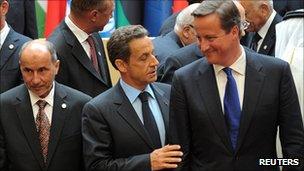Europe issue lurks for David Cameron
- Published
- comments

David Cameron and Nicolas Sarkozy have developed a close understanding
When David Cameron became British prime minister his first visits were to France and Germany. President Nicolas Sarkozy and Chancellor Angela Merkel were pleased and a little surprised. They found the new British leader charming and pragmatic.
The relationship with President Sarkozy - as was shown over Libya - has grown close. The two men describe themselves as friends.
From the dawn of the Britain's new coalition government, David Cameron made it clear Europe ranked low on his list of priorities. A vocal section of the electorate was highly exercised over power seeping away to Brussels but, when it came to reasons for voting, Europe was in about 10th place.
Before he got to Downing Street, David Cameron killed off any idea of a vote on the Lisbon Treaty. In his view it had been ratified and that was that. He was also keenly aware that Europe had all but destroyed the premierships of two former Conservative prime ministers.
Europe nicely 'parked'
In June 2010, I travelled on a train to Paris with British Foreign Secretary William Hague. He was not looking for a confrontation with Europe, he told me. The government would be "active", fully engaged in deepening the single market, co-operating on climate change and enlarging the EU to include Turkey.
The prime minister and his foreign secretary described themselves as "pragmatic Eurosceptics". They passed the Referendum Act, that requires any proposal that would significantly transfer further powers to Brussels to be put to the British people.
In the government's view Europe as an issue had been nicely parked on the sidelines. The crisis in the euro-zone has utterly changed that.
It is widely accepted in Europe that monetary union without fiscal union has not worked. There needs to be much closer co-ordination of tax and spending. Many of the details are still hazy, but ideas like a European finance minister or a European treasury or European economic government are now firmly on the table.
Angela Merkel said only recently that Europe should not "shy away from changing its treaty to create closer co-ordination of fiscal and economic policies".
That has awoken sleeping Eurosceptics in Britain. They see treaty change - in which all 27 EU members would have a veto - as handing Britain a strong negotiating hand. They eye a historic opportunity - and they want Britain to bargain.
Tory tails up
On Monday, a Tory backbench group will hold an inaugural session dedicated to reshaping Britain's relationship with Europe. It will be strongly supported by the new intake of Conservative MPs.
Many agree with the former Conservative Chancellor Nigel Lawson, who sees this as "a golden opportunity to renegotiate EU treaties and dispense at last with that troubling phrase 'every closer union'".
Coinciding with all this, the think tank Open Europe has published a report "The Case for European Localism, external". It seeks a new relationship with Brussels. It proposes new mechanisms to stop the EU involving itself in issues that should be left to national parliaments. It wants to repatriate some powers. And it wants the government to take legal action to ensure the principle of localism (or subsidiarity) is upheld.
There is now a ferment of ideas as to what could be included in a new "grand bargain" with Europe. Some Tories want to reclaim powers in the field of employment. Others want a veto over the appointment of British judges to the European Court of Justice. A former Tory minister has argued that the UK gives up its veto in exchange for opting out of EU legislation.
The prime minister has pledged to try to repatriate some social and employment laws, but Tory tails are up and they will want David Cameron to come away with from future negotiations with a big prize.
This opportunity to negotiate comes about because almost certainly new EU institutions will be needed to oversee national budgets as part of a fiscal union. That will take time but eventually these changes will be embodied in a new treaty.
Referendum fear
Curiously one of the cheerleaders to emerge for fiscal union is the Chancellor George Osborne. He finds himself supporting a move that he would utterly reject for the UK. Of course his interest is in improving stability in the eurozone, which would benefit Britain.
But fiscal union is not possible without a strong step towards political union. It would significantly change the EU.
The instinct amongst many European governments would be to avoid holding referenda. Europe's leaders are wary of consulting their people. But if significant control over tax and spending passes to a central European authority that cannot be passed off as a technical adjustment. After all one of the marks of a nation state is control over its budget, its taxes and its spending.
The expectation is that some countries would have to put a treaty change to a referendum. The British government would maintain that as the UK was not in the euro there was no need for a referendum. But it would be very difficult to deny the British people a say on an EU that was changing if their neighbours were trooping into the polling booths.
Foreign Secretary William Hague senses there is a mood within his party to seize the moment thrown up by the eurozone crisis. "We would like to see some powers returned from the EU to the UK," he told the Times.
The Work and Pensions Secretary, Ian Duncan Smith, said it was always Conservative policy to "change the relationship with Brussels". Both ministers cite the coalition as restraining them in their ambitions.
Of course the Liberal Democrats want to strengthen the ties with the European Union. Suddenly Europe may prove one of the deepest rifts within the government.